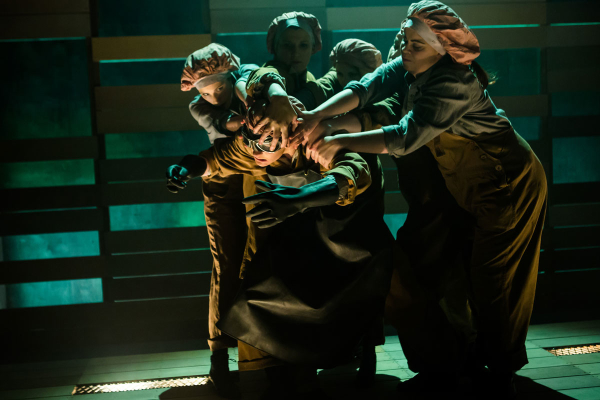
© Richard Davenport
On the day that The Sun newspaper decided to revoke its historical decision to remove bare breasts from page 3 comes Alex McSweeney's powerful, all-female play taking aim at the lack of progress made for women’s rights since the first world war. Out of the Cage is inspired by the women who took up positions in munitions factories following conscription in 1916 and their efforts to gain equal rights and pay for equal work.
The play opens on the eve of an all female strike and it becomes apparent very quickly that Out of the Cage has put its money where its mouth is and employed an all female cast. It is often striking to even get one strong female character but here we get eight, all played with wonderful nuance and imbued with meaning that is not dependent on men. Feminism is not portrayed as a homogeneous entity and the cast do an excellent job of highlighting disparate, conflicted people all fighting for the same goal. Strike leader Jane Byass (Milly Finch) and Dee Jessop (Tegen Hitchens) are mothers struggling to reconcile their need to work, protect their friends and family and to fight for what they are due. Their performances in particular are outstanding amongst a group frequently hitting all the right notes and tightening the right bolts.
As the plot develops, so does the relationships holding this band of defiant women together. The physicality of the second act is a welcome shift in pace, with the cast delivering powerful lines while engaged in the coarse operation of the factory surrounding them. Movement director Simon Pittman has created a discordant, striking second half that brings the exhausting plight of these characters to the fore. The tension of this act – as various components of the striking women mimic their surrounding machinery by bending, breaking and straining against the pressure – is palpable and utterly encapsulating.
These sharp moments are somewhat dulled by creeping elements of melodrama. This is not helped by the blunt placement of each of the characters as archetypes representing larger sections of society. Katherine Tozer’s upper class snob Nancy Longdon and Sarah Madigan’s rough Irish peasant Nelly Johnson are both well played, but lose some of their personality as they become stand-ins for their social classes. At these times the play has a tendency to be overly preachy: the audience does not need direct references to understand the significance of a women’s rights piece performed 100 years after its inspiration.
This does not, however, rob the play of its honest physical power and a vitality that resonates with a society still trying to reconcile the fractured efforts of feminism with a growing demand for equality.
Out of the Cage runs at the Park Theatre until 14 February 2015












